小学英语一般疑问句讲义
小学英语 一般疑问句

小学英语讲义一般疑问句一般疑问句一般疑问句:它是指用yes或no来回答的句子。
其结构是:系动词be/助动词/情态动词+主语+其他成分?一、含有be动词的陈述句转化为一般疑问句1、be 动词提前,主语第一人称改为第二人称,句号改问号,读升调。
2、my变成your our变成yourI am / We are 变Are you3、注意人名不论放在什么位置都要大写如 Tom is a student.Is Tom a student?4、一般疑问句翻译成汉语都有"吗"?例如 1)This is my English teacher.Is this your English teacher? 这是你的英语老师吗?肯定回答 Yes,it is. 否定回答 No,it isn’t.(注意:主语为单数的指示代词如this,that,应该用it替代。
主语为复数的指示代词如 these,those,应该用they替代。
) 2)It is our school.Is it your school? 它是你的学校吗?肯定回答 Yes,it is. 否定回答 No,it isn’t.3)We are students.Are you students? 你们是学生吗?肯定回答 Yes,we are. 否定回答 No,we aren’t.4) I am a student.Are you a student?你是学生吗?肯定回答 Yes,I am. 否定回答 No,I am not.(注意:一般疑问句有时也不用yes和no回答。
)相应练习一、将下列陈述句变为一般疑问句。
1、she is a doctor.(用肯定回答)________________________________________________________________________2、I am a boy.________________________________________________________________________3、we are students.(用否定回答)________________________________________________________________________4、He is my father.________________________________________________________________________二、含有情态动词(can,may,should……)的陈述句转化为一般疑问句。
小学英语一般疑问句PPT课件
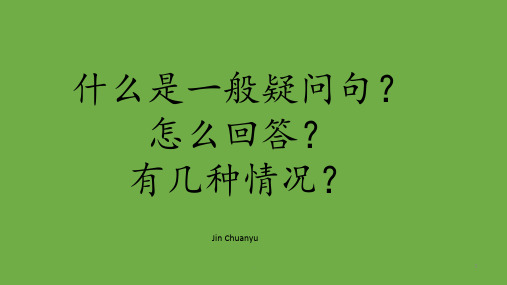
1. ___________________________________?
Yes, there is a bookstore next to the school.
2. ____________________________________?
Yes, there are some pandas in the mountains.
Do you go to bed at nine o’clock?
.
4
5 I will go back in two days.
Will you go back in two days?
6 He can play football. Can he play football?
7 The children are singing.
1 be动词: am, is, are, was, were
2 情态动词: can, may,will,must ,shall,should,could, might, would,need, …
3 助动词: do does did has/have(已经)
注意:
some在否定句, 疑问句中 要变成 any
4. Can your mother play the pipa?
No, _______ _______.
5 .May I have a look?
_____, ______ ______ ______(肯. 定)
9
二、根据图片回答问题.
1Are you watching TV? _________________.
2.Is he short and strong? ___________________.
小学英语疑问句总结

小学英语疑问句总结篇一:小学英语特殊疑问句和一般疑问句的归纳特殊疑问句和一般疑问句的答法一般疑问句通常都是一般疑问句通常都是 1.. 1.. 1..以以be be 开头开头2.2.以以Do Do,,Does Does,,Did Did 开头或以开头或以Can Can 开头开头回答方法回答方法::前面用什么提问的就用什么答。
只有两种回答方式:只有两种回答方式:11)肯定的,肯定的, Yes Yes Yes,主语,主语,主语 + + + 提问提问词.2)否定的No No,主语,主语,主语++提问词提问词+not. +not. +not. 【注意【注意【注意::问句与答句的第一二人称要互换】如:④主语是名字时的答语:看性别,男的用he ,女的用she ,其他的用it it 复数就用复数就用they they。
如:① Is she she……………… Is Is he he………………Is it it………………..Yes, ..Yes, ..Yes, she she is. Yes, is. Yes, he he he , , , it it , she isn,, he isn,t. No, it isn,t. ②Are they ………?Are the monkeys ………….Yes, they are. Yes, they are. No,they .Yes, they are. Yes, they are. No,they aren aren’’tNo,they aren tNo,they aren’’t③Do they ………?Does he ……..Did she …….Yes,they do. Yes,he , she did. No,they don don’’,he doesn ,he doesn’’t. No,she didn t. No,she didn’’t. t. ④④ Are you Are you……………….. .. Are you Are you……………….. Do you .. Do you .. Do you………………. .Yes, I , we ,I we ,I do. do. do. 或或 Yes, Yes, No, I No, I am am not. not. No, wearen aren’’t. No,I don ’t. t. 或或No No,, ⑤ Does Mike Does Mike……………….Is .Is ChenJi ChenJi……..Do your parents ..Do your parents……Yes ,he does. Yes , she , they do. No,he doesn they do. No,he doesn’’t. No, she isn t. No, she isn’’,they don ,they don’’t.一、专项练习。
小学英语语法详解疑问句-选择疑问句、特殊疑问句、一般疑问句、否定句、
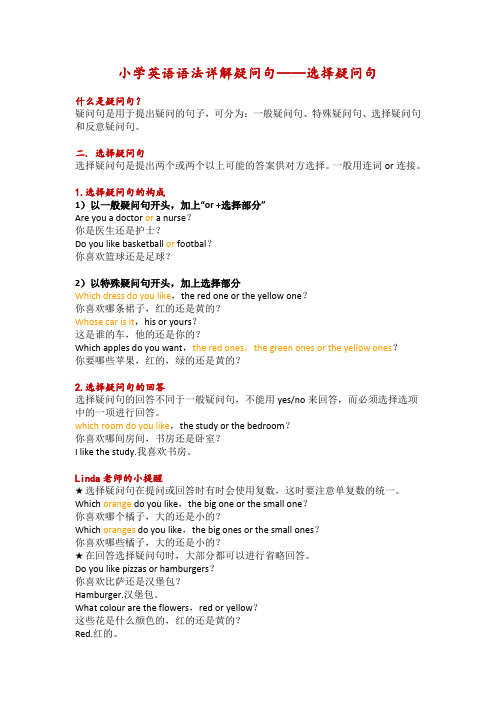
什么是疑问句?疑问句是用于提出疑问的句子,可分为:一般疑问句、特殊疑问句、选择疑问句和反意疑问句。
二. 选择疑问句选择疑问句是提出两个或两个以上可能的答案供对方选择。
一般用连词or连接。
1.选择疑问句的构成1)以一般疑问句开头,加上“or +选择部分”Are you a doctor or a nurse?你是医生还是护士?Do you like basketball or footbal?你喜欢篮球还是足球?2)以特殊疑问句开头,加上选择部分Which dress do you like,the red one or the yellow one?你喜欢哪条裙子,红的还是黄的?Whose car is it,his or yours?这是谁的车,他的还是你的?Which apples do you want,the red ones,the green ones or the yellow ones?你要哪些苹果,红的,绿的还是黄的?2.选择疑问句的回答选择疑问句的回答不同于一般疑问句,不能用yes/no来回答,而必须选择选项中的一项进行回答。
which room do you like,the study or the bedroom?你喜欢哪间房间,书房还是卧室?I like the study.我喜欢书房。
Linda老师的小提醒★选择疑问句在提问或回答时有时会使用复数,这时要注意单复数的统一。
Which orange do you like,the big one or the small one?你喜欢哪个橘子,大的还是小的?Which oranges do you like,the big ones or the small ones?你喜欢哪些橘子,大的还是小的?★在回答选择疑问句时,大部分都可以进行省略回答。
Do you like pizzas or hamburgers?你喜欢比萨还是汉堡包?Hamburger.汉堡包。
小学英语语法---一般疑问句和特殊疑问句ppt课件
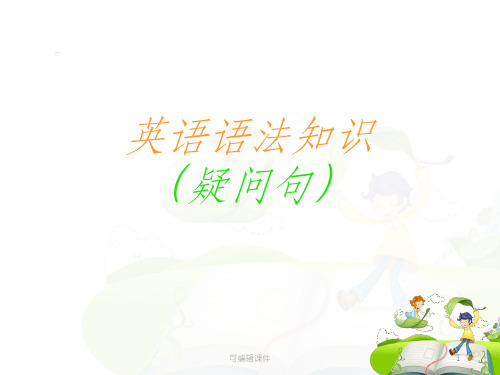
可编辑课件
4
e.g
This is Amy's bike.(一般疑问句)
Is this Amy's bike?
Yes, this is. (肯定回答)错误
No, this isn‘t. (否定回答)错误
Did you go to Beijing last weekend?
Yes, I did. (肯定回答)
2、如句子里是动词就在这些词前加 don't,doesn't,didn't
(1)主语是第一、二人称(复数)加don’t,第三人称单数加
doesn't
(2)如果是过去式就加didn't
例:I like dogs.
She likes swimming.
I don‘t like dogs.
She doesn’t like swimming.
No, I didn't. (否定回答)
I have some books. (一般疑问句)
Do you have any b可o编辑o课件ks?
5
变否定句的做法:
1、如句子里是be动词:am,is,are,was,were 就在这些词后加 not
例: He is Tom.
He is not Tom.
( B) 25. ______ tea did you have?
Two cups. • How many B. How much C. How soon D. Which
可编辑课件
15
感谢亲观看此幻灯片,此课件部分内容来源于网络, 如有侵权请及时联系我们删除,谢谢配合!
感 谢 阅
读感
谢
Unit 6 语法(复习讲义)五年级英语上册(译林版三起)

Unit 6 My e-friend语法梳理:一般现在时的疑问句精讲精练(含答案)一、一般现在时的一般疑问句一般疑问句是疑问句的一种,通常读升调,一般用yes或no来回答。
1.be动词引导的一般疑问句,基本结构为“Am/Is/Are+主语+其他?”。
例如:—Are you a student?你是一名学生吗?—Yes,I am.是的,我是。
—Is your father a teacher?你的父亲是一名教师吗?—No, he isn't. 不,他不是。
2.情态动词(can, would, should等)引导的一般疑问句,基本结构为“情态动词+主语+动词原形+其他?”。
例如:—Can you play basketball? 你会打篮球吗?—Yes,I can. 是的,我会。
/No, I can't. 不,我不会。
注意:情态动词本身有一定的词义,但是通常不独立作谓语,一般和动词原形一起使用,表示说话人对这一动作或状态的看法或主观设想。
情态动词本身没有第三人称单数形式,后面一般接动词原形。
3.助动词do/does引导的一般疑问句,基本结构为“助动词+主语+动词原形+其他?”。
例如:—Do you like this dog?你喜欢这只狗吗?—Yes, I do. 是的,我喜欢。
/No, I don't. 不,我不喜欢。
—Does Yang Ling play the piano at home? 杨玲在家弹钢琴吗?—Yes, she does. 是的,她弹。
/No, she doesn't. 不,她不弹。
注意:do/does提问的一般疑问句也要用do/does 或don’t/doesn’t回答。
二、一般现在时的特殊疑问句以特殊疑问词开头,对句子中的某一成分进行提问的句子叫特殊疑问句,一般读降调。
常用的疑问词有what, where, who, when, why, which, how等。
小学英语肯定句否定句一般疑问句和特殊疑问句的详解
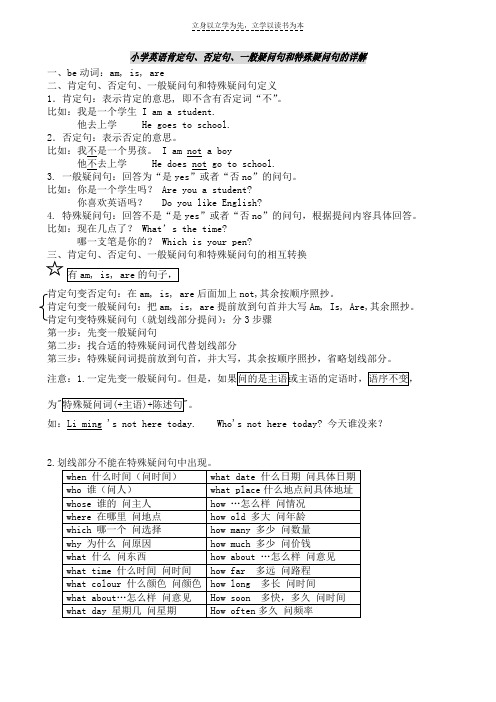
小学英语肯定句、否定句、一般疑问句和特殊疑问句的详解一、be动词:am, is, are二、肯定句、否定句、一般疑问句和特殊疑问句定义1.肯定句:表示肯定的意思, 即不含有否定词“不”。
比如:我是一个学生 I am a student.他去上学 He goes to school.2.否定句:表示否定的意思。
比如:我不是一个男孩。
I am not a boy他不去上学 He does not go to school.3. 一般疑问句:回答为“是yes”或者“否no”的问句。
比如:你是一个学生吗? Are you a student?你喜欢英语吗? Do you like English?4. 特殊疑问句:回答不是“是yes”或者“否no”的问句,根据提问内容具体回答。
比如:现在几点了? What’s the time?哪一支笔是你的? Which is your pen?肯定句变否定句:在am, is, are后面加上not,其余按顺序照抄。
肯定句变一般疑问句:把am, is, are提前放到句首并大写Am, Is, Are,其余照抄。
肯定句变特殊疑问句(就划线部分提问):分3步骤第一步:先变一般疑问句第二步:找合适的特殊疑问词代替划线部分第三步:特殊疑问词提前放到句首,并大写,其余按顺序照抄,省略划线部分。
注意:1.如:Li ming 's not here today. Who's not here today? 今天谁没来?2.例如:1.肯定句、否定句和一般疑问句的互换肯定句:This is a book.否定句:一般疑问句:Is this a book?肯定回答:Yes, it is.否定回答:No, it isn’t.2.就划线部分提问(变特殊疑问句)This is a book.第一步:变一般疑问句 Is this a book?第二步:找合适的特殊疑问词 Is this what ?特殊疑问词提前放到句首,并大写,其余按顺序照抄,省略划线部分。
小学英语 变一般疑问句详细讲解课件
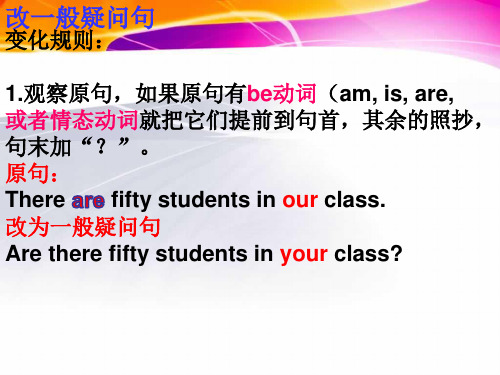
some 和any意思都是:一些 但是用法有区别。 some 用在肯定句,any用在否定句和疑问句。
There are some books in my bag.(肯定句) There are not any books in my bag.(否定句) Are there any books in your bag? (疑问句)
(5) Amy likes pears.
D_o__e_sAmy l_i_k_e_ ____ pears ?
改一般疑问句
变化规则:
2.如果句中没有be动词就用Do或Does。(动词是 原形用Do;动词是第三人称单数用Does; 原句: We like music. 改为一般疑问句 Do you like music? 原句 He likes art. 改为一般疑问句 Does he like art?
3.注意:改句时,第一人称改为第二人称:I am 改为 Are you; We are 改为 Are you; some改为any; do、does、后的动词改为原形。 句尾加问号。
把下列句子改为一般疑问句。
(1)I am a good student.
_A_r_e____ __y_o__u__ a good student?
(2) He can swim.
__C__a_n_____ __h__e______ swim?
(3) ngling _l_ik_e___ apples?
改一般疑问句
变化规则:
1.观察原句,如果原句有be动词(am, is, are, 或者情态动词就把它们提前到句首,其余的照抄, 句末加“?”。 原句: There fifty students in our class. 改为一般疑问句 Are there fifty students in your class?
小学英语知识归纳总结:一般疑问句

小学英语知识归纳总结:一般疑问句1. 概念能用yes / no(或相当于yes / no)回答的问句叫一般疑问句。
2. 含系动词be的一般疑问句的构成具体地说,就是当陈述句中有am /is / are时,可直接将它们提至主语前,但如遇第一人称,最好将其置换成第二人称。
如:I'm in Class 2, Grade 1. →Are you in Class 2, Grade 1? 你是在一年级二班吗?3. 含情态动词的一般疑问句的构成一般疑问句面前人人平等:情态动词与am / is / are一样,也可直接将它们提至主语前,所以问题迎刃而解了。
如:I can spell it. →Can you spell it? 你会拼写它吗?4. 含实义动词的一般疑问句的构成含实义动词的一般疑问句的构成稍微有点讲究,要在句首加do;如逢主语为第三人称单数,谓语动词为一般现在时单数第三人称形式"v-(e)s"时,奉does为座上宾并要变回原形(如has→have,likes→like等);有时陈述句中的some还要变作any等。
如:She lives in Beijing. →Does she live in Beijing? 她住在北京吗?I like English. →Do you like English? 你喜欢英语吗?There are some books on my desk.→Are there any books on your desk?5. 少数口语化的一般疑问句如问一个与前文相同的问句时,可省略成"And you?"或"What / How about...?"等;甚至只抓关键词,读作升调。
如:Your pen? 你的钢笔?6. 小插曲:一般疑问句的语调大部分的一般疑问句都应读作升调(↗),并落在最后一个单词身上。
如:Is it a Chinese car↗?7. 一般疑问句的应答用yes / no(或相当于yes / no的词)回答,并怎么问怎么答(句首为情态动词am / is / are 还是do /does),简略回答时要注意缩写(否定的n't)和采用相应的人称代词以避免重复:即"Yes,主语(代词)+情态动词或am / is / are或do / does."表示肯定;"No,主语(代词)+情态动词或am / is / are或者do / does not(n't)."表示否定。
小学英语一般疑问句和特殊疑问句(附练习题)
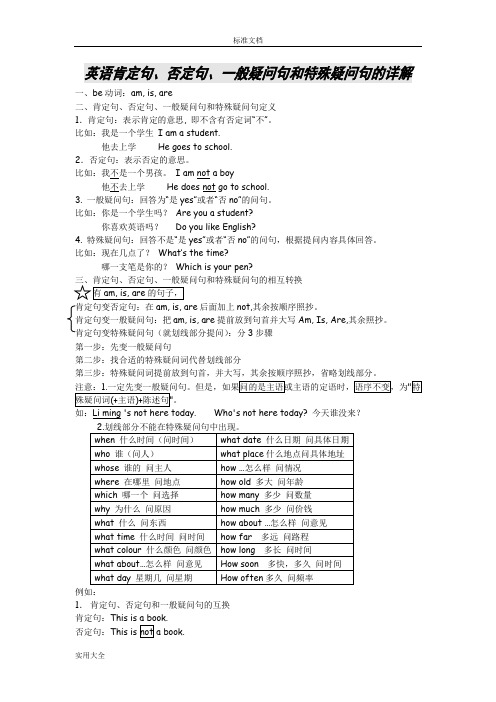
英语肯定句、否定句、一般疑问句和特殊疑问句的详解一、be动词:am, is, are二、肯定句、否定句、一般疑问句和特殊疑问句定义1.肯定句:表示肯定的意思, 即不含有否定词“不”。
比如:我是一个学生I am a student.他去上学He goes to school.2.否定句:表示否定的意思。
比如:我不是一个男孩。
I am not a boy他不去上学He does not go to school.3. 一般疑问句:回答为“是yes”或者“否no”的问句。
比如:你是一个学生吗?Are you a student?你喜欢英语吗?Do you like English?4. 特殊疑问句:回答不是“是yes”或者“否no”的问句,根据提问内容具体回答。
比如:现在几点了?What’s the time?哪一支笔是你的?Which is your pen?am, is, are后面加上not,其余按顺序照抄。
肯定句变一般疑问句:把am, is, are提前放到句首并大写Am, Is, Are,其余照抄。
:分3步骤第一步:先变一般疑问句第二步:找合适的特殊疑问词代替划线部分第三步:特殊疑问词提前放到句首,并大写,其余按顺序照抄,省略划线部分。
如:Li ming 's not here today.Who's not here today? 今天谁没来?例如:1.肯定句、否定句和一般疑问句的互换肯定句:否定句:一般疑问句:Is this a book?肯定回答:Yes, it is.否定回答:No, it isn’t.2.就划线部分提问(变特殊疑问句)This is a book.第一步:变一般疑问句Is this a book?第二步:找合适的特殊疑问词Is this what ?第三步:特殊疑问词提前放到句首,并大写,其余按顺序照抄,省略划线部分。
do not或者does not,其余按顺序照抄动词用原形肯定句变一般疑问句:在句首加do或者does并大写,其余照抄。
小学英语一般疑问句讲义
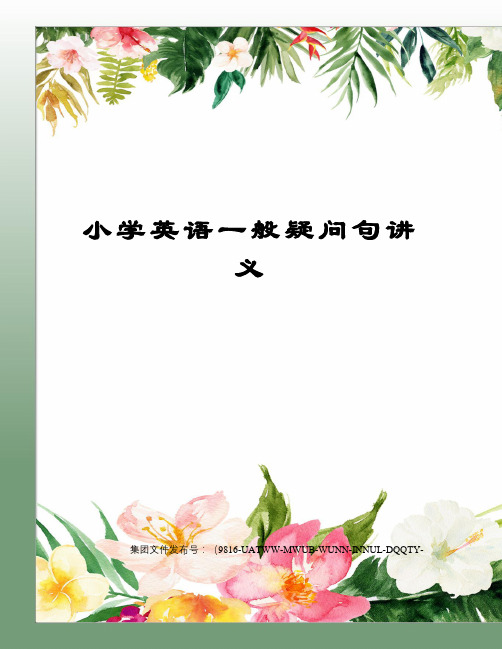
小学英语一般疑问句讲义集团文件发布号:(9816-UATWW-MWUB-WUNN-INNUL-DQQTY-小五英语个性化辅导第二讲一般疑问句【知识点:一般疑问句概述】用Yes或No作答的疑问句叫一般疑问句。
其基本结构为:be/助动词/情态动词+主语+谓语/表语+(其他) 。
一般疑问句还有下列特点:1、以be动词、助动词或情态动词开头;Eg::Is your father a teacher?Does Catherine like animals?Can Jenny speak French?2、往往读升调;3、译成汉语,都可以带上“吗”,例如上面三句可分别译为:你父亲是老师吗凯瑟琳喜欢动物吗詹妮会说法语吗【重点】一、将陈述句变成一般疑问句要将陈述句变成一般疑问句,可以遵循下列步骤:1.看句中有没有be动词(am、is、 are、 was、 were)、助动词(do、does、did、 have、 had)或情态动词(can、must、will、may等),如果有,将其提到句首,句末打上问号可。
eg:It was rainy yesterday.→Was it rainy yesterday?Tom's father can play the piano.→Can Tom's father play the piano?I have finished my homework.→Have you finished your homework?2.如果句中没有be动词、助动词或情态动词,则根据谓语动词的形式借助do的相应形式放在句首。
具体方法是:如果谓语动词是原形,则借do;如果谓语动词是一般现在时第三人称单数形式,则借does;如果谓语动词是过去式,则借did. 需要注意的是,借does或did后,原句的谓语动词要变回原形。
例:They go to school by bike.→Do they go to school by bike?Bill gets up at 6:30 every day.→Does bill gets up at 6:30 every day?The students saw a film yesterday.→Did the students see a film yesterday?二、一般疑问句的回答一般疑问句往往采用简短回答,共由三部分(三个单词)组成,对这三部分(三个单词)的确定可以概括例下:1.第一个词:不是Yes就是No。
小学英语语法---一般疑问句和特殊疑问句

Homework :作业 (划线部分提问)
1.Mike went to Chongqing yesterday. 2.My father went to Shanghai last night. 3.John is playing football in the grass. 4.I go to Xingjiang by plane.
5.Amy likes summer very much.
Thank You !
Mike: Where _____are we going to this year? Mum: we will go to Harbin. When Mike: ______are we going to Harbin? Mum: On 10th Octomber. How Mike: ______do you go to there? Mum: By plane. Mike: Where _____are we going to stay in Harbin? Mum: In Grandma’s big house. What Mike: _____does Grandma like eating? Mum: She likes eggs very much. Mike: Which ______season is the best time to Harbin? Mum: Winter. Mike: Why _____? Mum: Because we can make a snowman there.
Mike: My father.
A How B Where C What D Who 3.A: Was this book in the desk?
小学英语一般疑问句

小学英语讲义一般疑问句一般疑问句一般疑问句:它是指用yes或no来回答的句子。
其结构是:系动词be/助动词/情态动词+主语+其他成分?一、含有be动词的陈述句转化为一般疑问句1、be 动词提前,主语第一人称改为第二人称,句号改问号,读升调。
2、my变成yourour变成yourI am / We are 变Are you3、注意人名不论放在什么位置都要大写如 Tom is a student.Is Tom a student?4、一般疑问句翻译成汉语都有"吗"?例如1)This is my English teacher.Is this your English teacher? 这是你的英语老师吗?肯定回答 Yes,it is. 否定回答 No,it isn’t.(注意:主语为单数的指示代词如this,that,应该用it替代。
主语为复数的指示代词如 these,those,应该用they替代。
)2)It is our school.Is it your school? 它是你的学校吗?肯定回答 Yes,it is. 否定回答 No,it isn’t.3)We are students. Are you students? 你们是学生吗?肯定回答 Yes,we are. 否定回答 No,we aren’t.4) I am a student.Are you a student?你是学生吗?肯定回答 Yes,I am. 否定回答 No,I am not.(注意:一般疑问句有时也不用yes和no回答。
)相应练习一、将下列陈述句变为一般疑问句。
1、she is a doctor.(用肯定回答)________________________________________________________________________2、I am a boy.________________________________________________________________________3、we are students.(用否定回答)________________________________________________________________________4、He is my father.________________________________________________________________________二、含有情态动词(can,may,should……)的陈述句转化为一般疑问句。
小学英语语法——一般疑问句
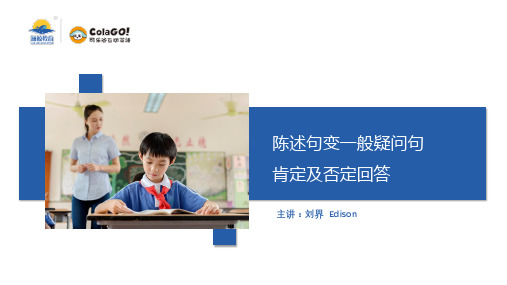
03.I am a student. 一般疑问句就是: Are you a student? 肯定回答:Yes, I am. 否定回答:No, I’m not. 04.We can help you. 一般疑问句就是: Can we help you? 肯定回答:Yes, we can. 否定回答:No, we can’t.
08.He can play basketball.
Can he play basketball?
肯定回答:Yes, he can.
否定回答:No, he can’t.
09. He is crying under the tree.
Is he crying under the tree?
肯定回答:Yes, he is.
如果主语是I或是we的,一般疑问句一般情况下要把人 称改为you。反之you要改成I,we,me或us。
01.His father is an English teacher.
Is his father an English teacher?
肯定回答:Yes, he is.
பைடு நூலகம்
否定回答: No, he isn’t.
02.They can swim. Can they swim?
肯定回答:Yes, they can. 否定回答: No, they can’t.
03.She is Jim’s mother.
Is she Jim’s mother?
肯定回答:Yes, she is.
否定回答: No, she isn’t.
陈述句变一般疑问句 肯定及否定回答
主讲:刘界 Edison
陈述句变为一般疑问句,首先看句中有没有系动词be或情态动词,如 果有,把be或情态动词直接提到句首就可以了;如果没有,要用助动 词do 或does 来帮助。基本句式如下: Be + 主语 +宾语 + 其他 + ? 情态动词 + 主语 + 谓语 + 宾语 + 其他 + ? Do(Does + 主语 + 谓语 + 宾语 + 其他 + ?
【免费】小学三年级英语语法:一般疑问句及特殊疑问句
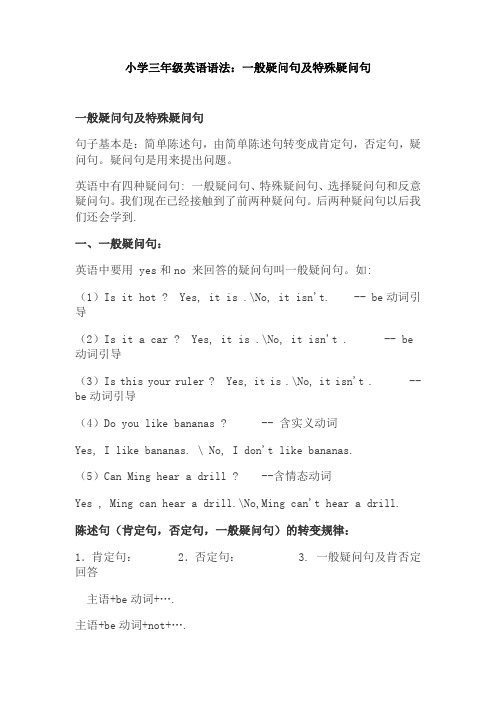
小学三年级英语语法:一般疑问句及特殊疑问句一般疑问句及特殊疑问句句子基本是:简单陈述句,由简单陈述句转变成肯定句,否定句,疑问句。
疑问句是用来提出问题。
英语中有四种疑问句: 一般疑问句、特殊疑问句、选择疑问句和反意疑问句。
我们现在已经接触到了前两种疑问句。
后两种疑问句以后我们还会学到.一、一般疑问句:英语中要用 yes和no 来回答的疑问句叫一般疑问句。
如:(1)Is it hot ? Yes, it is .\No, it isn't. -- be动词引导(2)Is it a car ? Yes, it is .\No, it isn't . -- be动词引导(3)Is this your ruler ? Yes, it is .\No, it isn't . -- be动词引导(4)Do you like bananas ? -- 含实义动词Yes, I like bananas. \ No, I don't like bananas.(5)Can Ming hear a drill ? --含情态动词Yes , Ming can hear a drill.\No,Ming can't hear a drill.陈述句(肯定句,否定句,一般疑问句)的转变规律:1.肯定句: 2.否定句: 3. 一般疑问句及肯否定回答主语+be动词+….主语+be动词+not+….be动词+主语+…?Yes, 主语+be动词./No, 主语+be动词+not.I am a teacher. I am not a teacher. Are you a teacher?--Yes, I am./ No, I am not.My mother is thin. My mother is not /isn'tthin. Is your mother thin?--Yes, she is./ No, she isn't.They are insects. They are not/aren't insects. Are they insects?--Yes. they are./ No, they aren't.主语+情态动词can+…主语+情态动词can+ not+….情态动词can+主语+…?Yes, 主语+情态动词can/No,主语+情态动词can+ notHe can jump. Hecan not/can't jump. Can he jump?--Yes,he can./ No, he can't.主语+动词+….主语+助动词do/does+not助动词do/does+主语+…. 动词原形 +….动词原形?Yes, 主语+助动词do/does.No, 主语+助动词do/does+not.He likes to eat apples. He doesn't like to eat apples. Does he like to eat apples?Yes,he does./ No,he doesn't.We like to eat apples. We don't like to eat apples. Do you like to eat apples?Yes,we do. /No,we don't.二、祈使句:表示请求、命令、建议或劝告等的句子叫祈使句,主语you常省略。
小学英语一般疑问句讲义

⼩学英语⼀般疑问句讲义⼩五英语个性化辅导第⼆讲⼀般疑问句【知识点:⼀般疑问句概述】⽤Yes或No作答的疑问句叫⼀般疑问句。
其基本结构为:be/助动词/情态动词+主语+谓语/表语+(其他) 。
⼀般疑问句还有下列特点:1、以be动词、助动词或情态动词开头;Eg::Is your father a teacher?Does Catherine like animals?Can Jenny speak French?2、往往读升调;3、译成汉语,都可以带上“吗”,例如上⾯三句可分别译为:你⽗亲是⽼师吗?凯瑟琳喜欢动物吗?詹妮会说法语吗?【重点】⼀、将陈述句变成⼀般疑问句?要将陈述句变成⼀般疑问句,可以遵循下列步骤:1.看句中有没有be动词(am、is、are、was、were)、助动词(do、does、did、have、had)或情态动词(can、must、will、may等),如果有,将其提到句⾸,句末打上问号可。
eg:It was rainy yesterday.→Was it rainy yesterday?Tom's father can play the piano.→Can Tom's father play the piano?I have finished my homework.→Have you finished your homework?2.如果句中没有be动词、助动词或情态动词,则根据谓语动词的形式借助do的相应形式放在句⾸。
具体⽅法是:如果谓语动词是原形,则借do;如果谓语动词是⼀般现在时第三⼈称单数形式,则借does;如果谓语动词是过去式,则借did. 需要注意的是,借does 或did后,原句的谓语动词要变回原形。
例:They go to school by bike.→Do they go to school by bike?Bill gets up at 6:30 every day.→Does bill gets up at 6:30 every day?The students saw a film yesterday.→Did the students see a film yesterday?⼆、⼀般疑问句的回答⼀般疑问句往往采⽤简短回答,共由三部分(三个单词)组成,对这三部分(三个单词)的确定可以概括例下:1.第⼀个词:不是Yes就是No。
小学英语陈述句、一般疑问句和特殊疑问句
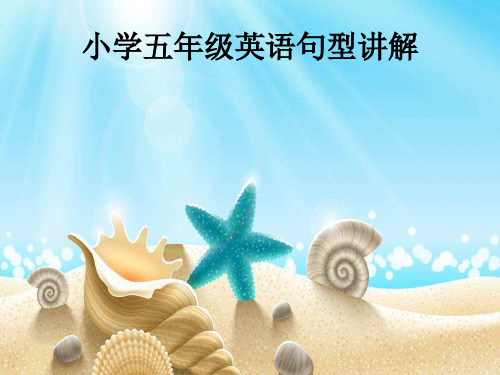
• _______________________________________
• 3.He can clean the classroom.
He likes apples. do not=don’t
He does not like apples. does not=doesn’t
肯定句否定句转换习题。
1.Tom and Mike are friends. 2.I’m a students. 3.Your father can ride a bike. 4.They can play football after school. 5.We come from China. 6.He likes playing basketball. 7.Have some bread, Tom.
小学五年级英语句型讲解
英语陈述句变一般疑问句口 诀:
①见了be和can,快快提上前。
be动词是否变isБайду номын сангаас am/ are 由后面的来决定。 can的变化最简单,所有人称都用can。
②动词为实义,do和does上前线。
单三人称用does,动词一定要还原。 其他人称都用do。第一人称变第二。
• 把下列句子变成一般疑问句
Yes, I do.
Yes, he does.
No, I don’t.
No, he doesn’t.
They like apples.
Do they like apples? Yes, they do, No, they don’t.
- 1、下载文档前请自行甄别文档内容的完整性,平台不提供额外的编辑、内容补充、找答案等附加服务。
- 2、"仅部分预览"的文档,不可在线预览部分如存在完整性等问题,可反馈申请退款(可完整预览的文档不适用该条件!)。
- 3、如文档侵犯您的权益,请联系客服反馈,我们会尽快为您处理(人工客服工作时间:9:00-18:30)。
小五英语个性化辅导第二讲一般疑问句【知识点:一般疑问句概述】用Yes或No作答的疑问句叫一般疑问句。
其基本结构为:be/助动词/情态动词+主语+谓语/表语+(其他) 。
一般疑问句还有下列特点:1、以be动词、助动词或情态动词开头;Eg::Is your father a teacherDoes Catherine like animalsCan Jenny speak French2、往往读升调;3、译成汉语,都可以带上“吗”,例如上面三句可分别译为:你父亲是老师吗凯瑟琳喜欢动物吗詹妮会说法语吗【重点】一、将陈述句变成一般疑问句要将陈述句变成一般疑问句,可以遵循下列步骤:1.看句中有没有be动词(am、is、are、was、were)、助动词(do、does、did、have、had)或情态动词(can、must、will、may等),如果有,将其提到句首,句末打上问号可。
eg:It was rainy yesterday.→Was it rainy yesterdayTom's father can play the piano.→Can Tom's father play the pianoI have finished my homework.→Have you finished your homework2.如果句中没有be动词、助动词或情态动词,则根据谓语动词的形式借助do的相应形式放在句首。
具体方法是:如果谓语动词是原形,则借do;如果谓语动词是一般现在时第三人称单数形式,则借does;如果谓语动词是过去式,则借did. 需要注意的是,借does 或did后,原句的谓语动词要变回原形。
例:They go to school by bike.→Do they go to school by bikeBill gets up at 6:30 every day.→Does bill gets up at 6:30 every dayThe students saw a film yesterday.→Did the students see a film yesterday二、一般疑问句的回答一般疑问句往往采用简短回答,共由三部分(三个单词)组成,对这三部分(三个单词)的确定可以概括例下:1.第一个词:不是Yes就是No。
(有时根据语气的不同,Yes可由Sure, Certainly, Of course,no 可用never,not at all等代替)eg: (1)—Can you help me你能帮个忙吗?—Certainly.当然。
(2)—Have you been there你到过那里吗?—Never.从来没有。
2.第二个词:问谁答谁。
即答语中的主语须与问句的主语一致(但必须用主格代词)。
eg:Does she clean her room every day Yes, she does.Is Anna′s father a doctor No,he isn′t.如果主语是this that,回答时用it 代替,如果问句中主语these, those,回答时用they 代替。
3.第三个词:用什么问,用什么答。
即沿用问句中的引导词。
Can Jim play soccer Yes, he can.Does Mr Bean speak English Yes, he does.需要注意问题:用may 引导的问句,肯定回答用may,否定回答用can′t 或mustn′t,用must 引导的问句,肯定回答用must,否定回答用needn′t.eg:May I go to the park now Yes, you may. /No, you mustn′t.Must I wash my clothes now Yes, you must. /No, you needn′t.4.用No开头作否定回答时,结尾要加上not。
因为回答必须是三部分,所以否定回答必须缩写,而肯定回答不能缩写。
eg:Did Thomas come here yesterday Yes, he did./ No ,he didn′t.Is Lin Lin in Class 3 Yes, she is. / No, she isn′t.或(No, she′s not).【难点】一、陈述句变一般疑问句应注意的事项陈述句变成一般疑问句除了遵循上述规则以外,还应注意下列几点:1.如果陈述句中有第一人称,则变问句时最好要变为第二人称。
eg:I usually have lunch at school.→Do you usually have lunch at schoolMy father is playing soccer.→Is your father playing soccer2.如果陈述句中有some, 则变问句时往往要变成any 。
Eg: There is some water on the playground.→Is there any water on t he playground3.复合句变一般疑问句通常只变主句,从句不变。
eg:I know he comes from Canada.→Do you know he comes from Canada4.如果句中含有实义动词have且表示“有”时,除借do外,也可将其直接提到句首。
Eg:I have some friends in America.→Have you any friends in America/Do you have any friends in America二、一般疑问句的否定式?(1)一般疑问句的否定式,一般结构为系动词/助动词/情态动词+not+主语;也可为系动词/助动词/情态动词+主语+not,Do you not/Don’t you believe me 你不相信我Is it not / Isn’t it a lovely day 天气难道不好吗Are you not / Aren’t you coming你不来吗Will you not /Won’t you sit down 你不坐会儿吗Is he not / Isn’t he a doctor他不是医生吗Does Helen not /Doesn’t Helen like chocolate 海伦不喜欢巧克力吗?Will he not /Won’t he go with you他不和你一块儿去吗(2)否定疑问句并不单纯表示提问,它常常带有感情色彩。
否定疑问句的完全式比简略式所表达的语气更强烈些。
?1)否定疑问句常常带有惊异、赞叹或责难等语气,如:?Haven’t you read the newspaper?你没读过这份报纸呀?Won’t he come他不来了?2)否定疑问句有时暗示提问者期待着肯定的回答,如:?Shouldn’t we start now我们现在是不是该动身了?Wasn’t it an interesting film那部电影是不是很有趣?3)否定疑问句有时用来表示邀请或建议,如:?Wouldn’t you like to go with me你不想和我一块儿去吗?Won’t you have a cup of coffee你不喝杯咖啡吗?(3)否定的一般疑问句的答语中,yes的含义为“不”,no的含义为“是”,但在回答这类句子时,应该注意yes后接肯定结构,no后接否定结构,这和汉语习惯不同,如:?—Are you not Mr Smith你不是史密斯先生吗—Yes,Iam.不,我是。
/—No,I am not.是的,我不是。
?—Haven’t you read this book before 你从前没有读过这本书吗?—Yes,I have.不,我读过。
/—No,I haven’t.是的,我没有。
?—Don’tyou play chess你不下棋吗—Yes ,I do.不,我下棋。
/—No,I don’t.是的,我不下棋。
?教你一招:在这样的答语中,只要根据实际情况来判断,如果事实上是,就要用yes;如果事实上不是,就要用no。
A: Don’t you come from EnglandB: come from America.A. No, I doB. Yes, I doC. Yes, I don’tD. No, I don’t【实战演练】1. His father is an English teacher.2. These cats are crying.3. They can swim.4. I like to read English.5. I go to school on foot.6. His father goes to work by bus.7. His birthday is on the twentieth of November.8. Mrs. Li and Kitty are in a big shop.9. Kitty is wearing her new uniform.10. I want to have a model car.11. She wants a cup of coffee.12. Mrs. Li and Kitty watch television at night.13. I do my homework after school.【强化练习】陈述句变一般疑问句1. Everybody is in the classroom._________________________________________ ?2. The boy does some housework(家庭作业)at home._________________________________________ ?3. The children had a good time in the park(公园)._________________________________________ ?4. Jim has some story-books. (故事书)_________________________________________ ?5. The old man does morning exercises(早操)every morning._________________________________________ ?6. We are from China._________________________________________ ?7. He often goes to the library(图书馆)on Sundays._________________________________________ ?8. They have a class meeting every week.________________________________________9. She does ___10. He often watches11. There is no problem about it. ________________________________________12. My father likes play13. There are 5 students in the14. He has some15. They have Chinese16. Tom has few17. My parents can play tennis________________________________________18. He is watering the flowers in the19. This is my20. These are my家长签字:教师评语:。
